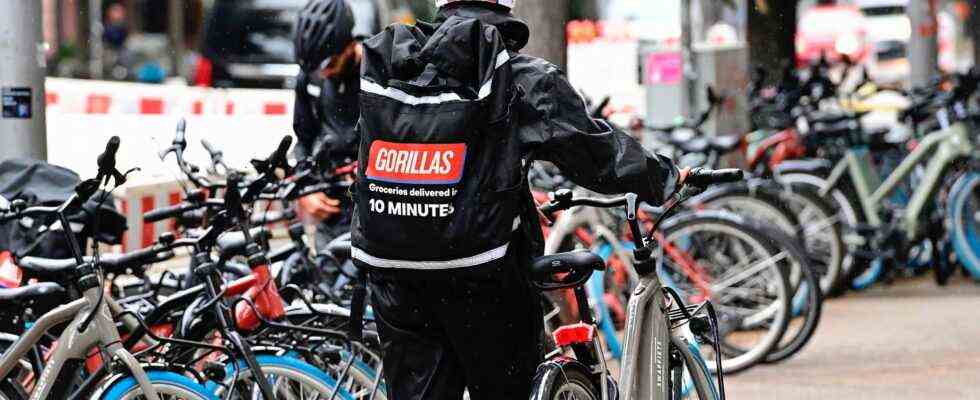Status: 07/24/2021 4:35 p.m.
Bicycle delivery services want to conquer parts of the grocery market in large cities. Their expansion course leads to growing pains, especially among employees. The success of the business model is not guaranteed.
Shop from the sofa, order groceries by mobile phone and receive the delivery at the door within ten or twenty minutes: It’s that easy for city dwellers in Germany who don’t want to go to the grocery store. This has recently been made possible by delivery services that transport the goods by bicycle for a small extra charge.
Rapid growth with limits?
The best-known of the companies, Gorillas, is mainly represented in downtown Berlin. Bicycle couriers swarm through the city districts from small warehouses. And the streets and sidewalks in front of the company branches can get clogged. The fact that the residents protest against it in a publicly effective way is programmed in the politically charged everyday life of Berlin. And the negative headline for the company too.
The company, which was only founded in Berlin in 2020, is one of the unicorns of the German economic landscape: start-ups that are valued at more than a billion dollars even before a possible IPO. A remarkable sum for a company whose business model is based on the fact that customers tend to order small quantities of goods – and at prices that are competitive with those in the supermarket.
So far, the company has been growing rapidly, thanks in part to investors. The capital is considered a model region for gorillas. But the limits of growth are, at least in theory, foreseeable. Bicycle couriers can only transport a limited number of goods – and in order to meet the promised delivery time, for example ten minutes, the warehouse must not be too far away. This could be difficult in the outskirts beyond the Berlin S-Bahn ring.
Competition in the market niche
Then there is the competition. First of all, there are the classic supermarkets. The ver.di union is closely monitoring the new industry. The Berlin press spokesman Andreas Splanemann is skeptical as to whether there will actually be more than a niche here: “Berlin has a large density of shops, the nearest supermarket is often within walking distance. In addition, many markets have their own delivery services anyway.” These providers have been on the market for years – and so far have remained a pure addition to the core business.
Nevertheless, there are other start-ups that have a very similar model to gorillas. Flink, for example, also comes from Berlin and also takes less than two euros delivery fee. Getir is another provider with a similar business model. And then there is Wolt, an established delivery service for food from restaurants. The company also wants to export groceries in the future. The competition is likely to get tougher.
Working conditions under criticism
Few customers, limited growth potential, a lot of competition: the unicorn gorillas and its competitors find themselves in a challenging starting position at the beginning of the boom predicted by some in the delivery industry.
This is not only felt by the residents, who are annoyed by the noise and hustle and bustle of the drivers, but also by the employees themselves. At Gorillas there have recently been so-called wildcat strikes, ie those that were organized by the staff themselves and not supported by a union. The demands: better working conditions, more money, extended protection against dismissal. There has not yet been an agreement, but there are other headlines that are ugly from the management’s point of view.
Federal Minister of Labor Heil in conversation with drivers of the Gorillas food delivery service in Berlin.
Image: dpa
Labor law improvements in prospect?
The fact that start-ups are on a course of confrontation with their employees so early in their company’s history is rather the exception. It remains to be seen whether the industrial action will lead to lasting improvements for workers. The staff changes quite often, for many the delivery service is more of a transitional job.
Most recently, Federal Labor Minister Hubertus Heil even met with the Gorillas employees. He could not make any specific promises, but did offer the prospect that the delivery services should receive stricter regulations in the future. That couldn’t make the business model any easier.

